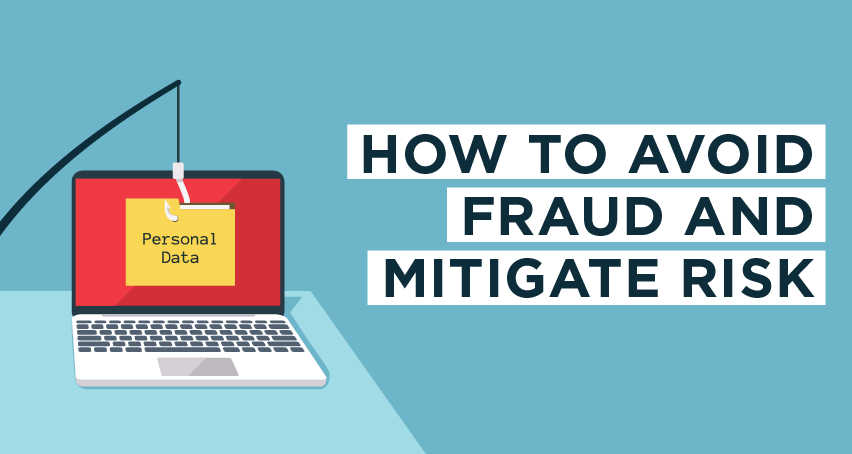Criminals looking to commit fraud are not new; however, many are taking advantage of the confusion caused by COVID-19. Employers and employees are trying to adapt to different and often challenging work situations that have resulted from the pandemic. This has allowed criminals more opportunity to commit crimes during the confusion. Below are ways to avoid fraud in your company as well as ways to mitigate loss.
Ways to Avoid Fraud:
- Identify and keep up to date on potential emerging scams.
- Verify everything possible with an outbound call to the FMCSA number on file.
- Do not click on links within emails.
- Change passwords often, including email passwords.
- Consider what information is stored in your emails. Do you have signatures, bank information, credit applications, etc. stored securely?
- Remove authorized dispatchers upon termination. Immediately remove access to company emails and files.
- Partner with reputable brokers using online reviews and third-party resources.
- Compare rates. Is it too good to be true? This could be an indication of a scam.
Fuel Advance and Fuel Card Fraud
One of the most popular scams involves fuel advances. Fraudsters often pose as a legitimate carrier and present the broker with a counterfeit Bill of Lading. This is used as proof the load was picked up to obtain a fraudulent fuel advance. To avoid the risk of being victimized, a reputable broker will make an outbound call to the phone number listed with FMCSA number to ensure the validity of the request and avoid fraud. Carriers should also take advantage of the tracking tools offered by the broker. If you’re a carrier, be sure your phone number is up to date with the FMCSA.
Fuel card fraud is rampant in the industry. Scammers attempt to gain access to fuel card accounts, then cut express checks from the account. To avoid this risk, always call into the fuel card customer service line. If someone calls wanting to confirm your fuel card account details, do not provide this information. Changing your account password is often a good practice. Also, ensure you change the password immediately if an employee that has access is terminated.
Identity Theft – Phishing, Pharming, and Spoofing
When you receive an email, you might see a link asking you to verify, confirm, or update your password or other personal information. Do not click on unknown links from outside emails, as this is how fraudsters get access to your personal info.
To avoid pharming, always use reputable anti-virus software and use a trusted internet service provider (ISP). You should always run computer security updates to keep your system secure and avoid fraud. Finally, double check the spelling of websites when you receive an email or go to a website. Oftentimes the pharmer uses a similarly spelled URL.
Spoofing involves fraudsters sending emails that mimic your domain. Most often, the email address will be off by a letter, symbol or number. Phone numbers are easily mimicked via cell phone apps. Criminals manipulate you into thinking the email or call is real. This could potentially cause you to download viruses or disclose sensitive information.
Digital Fraud and Data Breaches
Consider the information you send in emails. Do you use Yahoo, Gmail, or other common email providers? Do you have credit applications, bank information and signatures stored? If your email is hacked, this information could be used to gather data to commit fraud. For instance, if you have signatures stored within your emails as well as emails of people you conduct business with, it would be very easy to contact one of these businesses and have your bank account changed without your knowledge. To avoid the risk of being victimized, a reputable broker will make an outbound call to the FMCSA number to ensure the validity of the request.
Double Brokering
What is Double Brokering: If a freight broker books a load with a carrier and that carrier turns around and assigns the load to another carrier, this is considered a double-brokered load. It is not acceptable to reassign, transload, subcontract, etc., to another carrier without the original broker’s consent or without proper authority. Carriers who haul a double-brokered load may not get paid. If you’re late for an appointment, there is cargo damage, or the load is refused, you may have a difficult time determining the original broker or shipper of the load and they may not even know you exist. Chances are high the broker has already paid the initial, contracted carrier.
Co-Brokering: While co-brokered loads are not illegal, most carriers avoid them, and some brokers do not allow them. Carriers on these types of loads may not be paid as well and it is difficult to preserve clear lines of communication with the broker responsible for the load. Note, if the original broker did not perform acceptable vetting, the co-broker could turn out to be a con artist and you may not get paid.
Owner/Operator Agreements: As a carrier, you are permitted to assign a brokered load to an owner/operator who runs under your authority. You remain responsible for the load just as if you hauled it on one of your trucks.
Lease Agreements: There are very specific guidelines that need to be followed within a lease agreement. If these laws are not followed, the lease agreement becomes invalid. See the Federal Truth in Leasing Laws for more info.
How to Avoid Double-Brokering:
Verify Contact Info: Be sure the person on the other end of the phone is a legitimate contact. Cargo thieves and identity thieves will sometimes pretend to represent a reputable broker or carrier to gain your trust. They can even go as far as spoofing the carrier’s phone number. Never trust the inbound call. To avoid fraud, hang up and call back using the phone number listed by the FMCSA verifying the validity of the contact. If the broker can’t verify the person’s identity, do not accept the load.
Build Relationships: When you establish a successful relationship with a reputable broker or agent, look for opportunities to work with them in the future.
Review the BOL for the Correct Carrier Name: Reputable brokers regularly audit Bills of Lading (BOL). If the BOL has a different carrier name, this is a red flag that could possibly indicate a double-brokered load. This will, inevitably, delay payment and could result in negative reports being issued against those involved, impacting your ability to conduct business.
Cargo Theft
This can happen anywhere and at any time! Think of where you may leave your truck or trailer unattended: A truck stop, parking lot, loading dock, etc. Cargo theft is either a crime of convenience or a well-planned scam. A criminal may show up at a loading dock impersonating the carrier. They could enter a lot, hook up to the trailer and leave. Sometimes it is a matter of snatch and grab on unattended loads.
How to Mitigate Risk:
- Always work with a fully vetted broker.
- Never leave cargo unattended unless it’s completely secure. Park rear doors against a fence, light pole, etc. Use additional security features like using rear door locks, parking in a secure lot, and paying attention to your surroundings. Take away the crime of convenience.
- Keep in contact with your dispatcher if you plan an unscheduled stop. Take advantage of tracking tools offered by the broker.
- Take care of essentials before loading—fuel, food, sleep, etc.
- Check your load/trailer doors at every stop.
- Never discuss load details within earshot, including over a cell phone or CB. Crooks can use this as surveillance to steal the cargo.
Follow these suggestions to better protect your business, your drivers, and your cargo. There are plenty of tools and resources available to make decisions and help you verify information, so be sure to use them to remain safe.
###
The England Carrier Services (ECS) division offers a variety of services for carriers ranging from maintenance to support. As ECS members, carriers have access to nationwide discounts on fuel and tires from dedicated team members who are committed to finding the best price. ECS also provides factoring services with benefits such as same-day funding to a bank account or fuel card. These options allow carriers the freedom to focus on growing their business while saving time and money.



